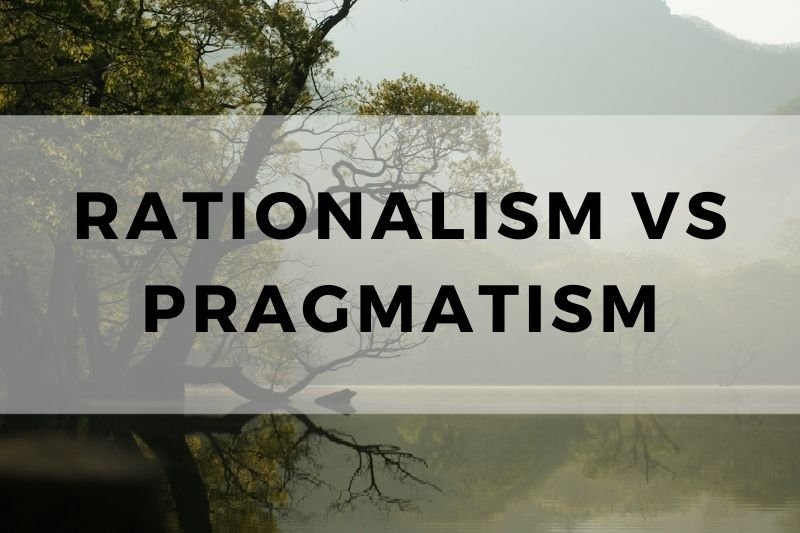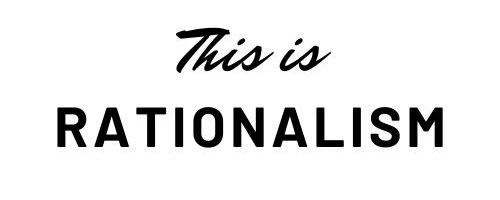
Rationalism and Pragmatism are two distinct philosophical approaches to understanding knowledge and decision-making. While Rationalism emphasizes reason and logic as the primary sources of truth, Pragmatism focuses on practical outcomes and real-world effectiveness. These two schools of thought often clash, yet they also offer valuable insights into how we think and act.
In this article, we’ll explore the key differences between Rationalism and Pragmatism, their strengths and weaknesses, and their broader philosophical implications. Understanding these philosophies will help clarify how they shape our ideas and guide our actions in everyday life.
What is Rationalism?
Rationalism is the belief that reason is the primary source of knowledge. According to this view, truths can be discovered through logic and intellectual deduction, independent of sensory experience. Rationalists argue that some knowledge is innate, and that certain truths are universally valid. Philosophers like Descartes and Spinoza championed this approach, emphasizing that the mind’s ability to reason is the foundation for understanding the world. For Rationalists, reason can provide certainty in ways that experience cannot. They focus on abstract principles and seek to understand the fundamental structures of reality through thought alone.
What is Pragmatism?
Pragmatism is a philosophy that values practical consequences over abstract reasoning. According to Pragmatists, the truth of an idea is determined by its usefulness and its ability to solve problems. Rather than focusing on theoretical principles, Pragmatism emphasizes action and results. Philosophers like William James and John Dewey highlighted how ideas should be tested through experience and their impact on everyday life. For Pragmatists, knowledge evolves through practical application. They believe that what works in real life is what matters most, and that truth is flexible, shaped by context and outcomes.
Key Differences Between Rationalism and Pragmatism
#1. Basis of Knowledge
Rationalism asserts that reason is the primary source of knowledge. Rationalists believe that logical deduction and intellectual insight can reveal truths independent of sensory experience. In contrast, Pragmatism argues that knowledge comes from practical experience. It holds that what we learn through action, observation, and testing is more important than abstract reasoning.
#2. Approach to Truth
For Rationalists, truth is objective and exists independently of human perception. They believe that through reason, we can uncover universal truths that hold across time and space. Pragmatists take a different view: they define truth as something that works in practice. A belief or idea is true if it leads to successful outcomes and solves problems in the real world.
#3. Role of Experience
Rationalists downplay the role of sensory experience in acquiring knowledge. They argue that reason and logic are sufficient to understand the world. Experience, to them, is unreliable and often misleading. Pragmatism, however, places heavy emphasis on experience. Knowledge is acquired through the process of engaging with the world, and ideas must be tested through experience to determine their truth.
#4. Certainty vs. Flexibility
Rationalism aims for certainty and clarity in understanding the world. Rationalists believe that by applying reason, we can achieve certain knowledge that is indisputable. Pragmatism, on the other hand, embraces flexibility. It acknowledges that truth can evolve and is contingent on its practical application. What works in one context may not work in another, so Pragmatists remain open to change.
#5. Epistemology
Rationalism holds that knowledge can be innate, or at least accessible through reason without the need for experience. This means that certain truths are known a priori—before any empirical observation. Pragmatism rejects this idea. Pragmatists argue that knowledge comes from experience, trial, and error. Truths are discovered through what works in practical situations, rather than being predetermined by reason alone.
#6. Focus on Reason vs. Action
Rationalism is centered around intellectual reasoning and deduction. It values the mind’s ability to think logically and draw conclusions based on axiomatic truths. Pragmatism, in contrast, emphasizes action. Ideas are not valued for their theoretical merit alone but for how they help solve problems and guide actions in the real world. Pragmatists are more concerned with what works than with abstract reasoning.
#7. Universality vs. Context
Rationalists believe in universal truths—ideas that hold universally, regardless of time, place, or situation. For example, laws of logic are considered true in all circumstances. Pragmatists, however, stress the importance of context. They argue that truth is not fixed but is determined by the specific conditions of a given situation. What works in one scenario may not be applicable in another.
#8. Impact on Science
Rationalism has greatly influenced the development of scientific theories. Rationalists contribute to the foundation of scientific knowledge by creating models and systems based on abstract reasoning. They focus on logical consistency and theoretical explanations. Pragmatism, on the other hand, has influenced the application of science. Pragmatists are more interested in how scientific theories function in practice and how they can be used to address real-world problems.
#9. Influence on Ethics
In ethics, Rationalism suggests that moral principles can be deduced from reason. Ethical truths are seen as objective, discoverable through rational inquiry. Pragmatism, however, connects ethics to the consequences of actions. A moral decision is judged by the practical outcomes it produces. Pragmatists argue that ethical choices should be based on what leads to the best results in real-world contexts, rather than adherence to abstract moral laws.
#10. Problem-Solving
Rationalism focuses on finding theoretical solutions to problems. Rationalists believe that by understanding underlying principles, they can deduce the correct course of action. Pragmatism, however, is more concerned with finding practical solutions. Pragmatists focus on what works in a given situation and prioritize actionable steps over theoretical clarity. Their approach is flexible and adaptable, responding to the needs of the moment rather than rigid principles.
Rationalism Vs Pragmatism: Strengths and Weaknesses
Rationalism
Strengths
- Clarity of Thought: Rationalism provides structured, logical frameworks that promote clear and consistent reasoning. This clarity allows for the precise analysis of complex concepts and systems.
- Universal Application: Rational principles, such as those in mathematics and logic, are universal. They apply consistently across various fields and situations, ensuring uniformity in understanding.
- Objective Truth: Rationalism’s pursuit of objective truth aims to remove biases and subjectivity, establishing truths that are valid regardless of personal perspectives or external factors.
- Theoretical Foundation: Rationalism contributes robust theoretical models for understanding abstract or complex ideas. It offers a solid intellectual foundation, especially useful in areas like mathematics, science, and philosophy.
Weaknesses
- Disconnection from Reality: Rationalism can become disconnected from real-world concerns. Its focus on abstract reasoning sometimes leads to solutions that are impractical or too theoretical to be useful in everyday life.
- Overemphasis on Reason: Rationalism tends to prioritize intellectual deduction over empirical experience. This may cause it to overlook insights gained through sensory perception or real-world experimentation, which can be essential for comprehensive understanding.
- Rigidity: Rationalism often operates within strict logical frameworks. While this promotes clarity, it can lead to inflexibility, where new or contradictory information is dismissed or unable to be integrated into the existing system.
- Lack of Practicality: By focusing on theoretical knowledge and abstract principles, Rationalism may fail to provide practical solutions to everyday challenges, especially in areas requiring immediate action or practical application.
Pragmatism
Strengths
- Practical Application: Pragmatism excels in addressing real-world issues by focusing on what works in practice. It is deeply concerned with the outcomes and effectiveness of ideas, making it especially useful for solving immediate, tangible problems.
- Flexibility: Pragmatism is adaptable. It recognizes that truth can shift depending on the situation, and it is willing to change its perspective based on practical results. This flexibility allows for a more responsive and evolving approach to problem-solving.
- Focus on Problem-Solving: Pragmatism is inherently solution-oriented. It prioritizes addressing concrete issues over abstract debates, making it highly effective in fields such as policy-making, education, and business.
- Inclusive of Experience: Pragmatism values real-world experience as a critical source of knowledge. By incorporating the lessons learned from trial and error, it provides a grounded approach to understanding and decision-making.
Weaknesses
- Lack of Clear Principles: Pragmatism can sometimes struggle to establish universally applicable principles or consistent ethical standards. Since truth is seen as context-dependent, it can lead to uncertainty or disagreements about what is “right” or “true” in a given situation.
- Subjectivity: Because Pragmatism ties truth to its practical consequences, there is a risk of subjectivity. Different people or cultures may have different interpretations of what works, leading to conflicting ideas of truth and justice.
- Short-Term Focus: Pragmatism’s emphasis on immediate results can sometimes neglect long-term considerations. It can favor quick fixes or short-term gains at the expense of more sustainable, enduring solutions.
- Potential for Pragmatic Inconsistency: Pragmatism’s adaptable nature can lead to inconsistencies. What works in one context may not be applicable in another, potentially resulting in contradictory or unreliable conclusions in different circumstances.
Philosophical Implications of Each Approach
Impact of Rationalism
Rationalism has had a profound effect on science, ethics, and metaphysics.
- Science: Rationalism’s focus on reason has shaped scientific methods and theories. It encourages the use of deduction and logical principles to form hypotheses and test theories. Scientific models often rely on abstract reasoning, helping to establish laws that apply universally.
- Ethics: In ethics, Rationalism contributes to moral systems based on reason. Theories like Kantian ethics assert that moral laws can be derived from logical principles. Rationalists argue that objective moral truths exist and can be discovered through reason.
- Metaphysics: Rationalism influences metaphysical inquiry by emphasizing the role of reason in understanding the nature of reality. It posits that certain truths about the world can be known through pure intellect, independent of sensory experience.
Impact of Pragmatism
Pragmatism significantly impacts education, politics, and problem-solving.
- Education: In education, Pragmatism stresses the importance of experiential learning. It encourages students to engage with the real world and learn through action. This approach focuses on developing critical thinking and problem-solving skills rather than rote memorization.
- Politics: Pragmatism shapes political decision-making by prioritizing practical outcomes. Policymakers often apply Pragmatism by considering what will work in practice rather than adhering strictly to ideological principles. This approach leads to flexible, context-based solutions.
- Problem-Solving: Pragmatism is highly effective in addressing real-world problems. It emphasizes practical solutions, trial and error, and adaptation. Pragmatists focus on what works in a given situation, rather than adhering to rigid theories or models.
Closing Thoughts
Rationalism and Pragmatism offer contrasting approaches to understanding knowledge, truth, and decision-making. While Rationalism emphasizes reason and universal truths, Pragmatism focuses on practical outcomes and adaptability. Both have their strengths and weaknesses, but their contributions are invaluable in shaping our worldview.
Rationalism provides clarity and theoretical foundations, while Pragmatism helps us navigate the complexities of the real world. By understanding the key differences between these philosophies, we can better appreciate how they influence science, ethics, education, and politics, guiding us toward more informed and effective decision-making.
